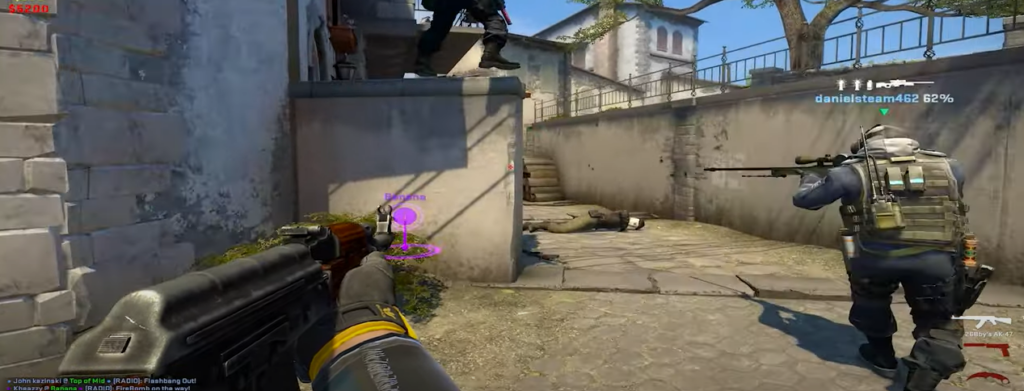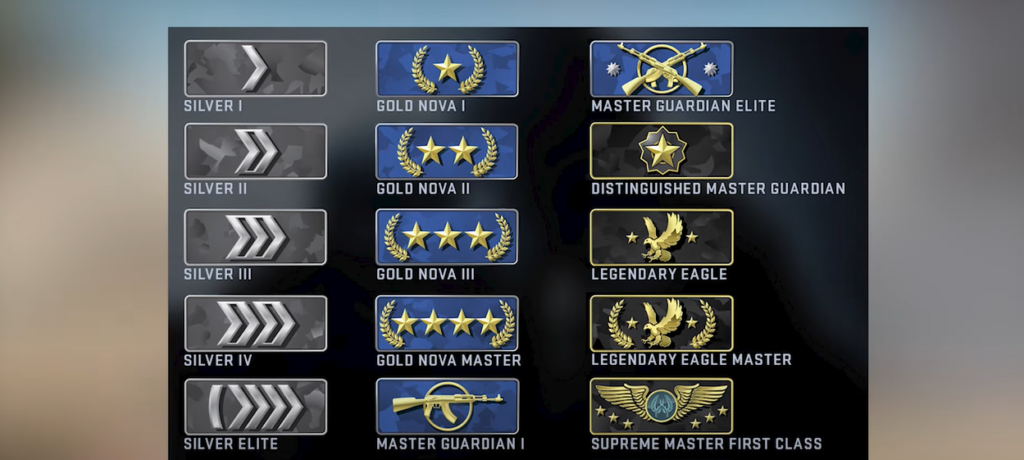Counter-Strike: Global Offensive (CS: GO), an iconic fixture in the esports world, boasts a unique competitive ranking system that encourages players to strive for growth and improvement. This system is a vital component of the gaming experience, keeping players engaged and pushing them to achieve higher ranks.
Unraveling CS: GO Ranks
In CS: GO, there are 18 ranks divided into four main categories. These categories reflect the players’ skill levels and their familiarity with the game:
1. Silver Ranks (6 Levels)
- Silver I (S1);
- Silver II (S2);
- Silver III (S3);
- Silver IV (S4);
- Silver Elite (SE);
- Silver Elite Master (SEM).
The Silver ranks are the entry point for beginners who are just embarking on their CS: GO journey. Typically, these ranks consist of players who are still learning the basics, developing an understanding of different weapons, and becoming familiar with the map layouts.
2. Gold Nova Ranks (4 Levels)
- Gold Nova I (GN1);
- Gold Nova II (GN2);
- Gold Nova III (GN3);
- Gold Nova Master (GNM).
The Gold Nova ranks are a step above the Silver category, consisting of players who have moved beyond the beginner stage. The gameplay tends to be more coordinated, and the players here usually display a more comprehensive understanding of the game’s tactical aspects, like well-executed team strategies and proper utilization of different weapons.
3. Master Guardian Ranks (4 Levels)
- Master Guardian I (MG1);
- Master Guardian II (MG2);
- Master Guardian Elite (MGE);
- Distinguished Master Guardian (DMG).
The Master Guardian ranks are occupied by players who have developed a substantial level of proficiency in the game. These players demonstrate enhanced reflexes, show an in-depth understanding of the game’s strategic components, and exhibit a more refined use of different weapons.
4. Elite Ranks (4 Levels)
- Legendary Eagle (LE);
- Legendary Eagle Master (LEM);
- Supreme Master First Class (SMFC);
- Global Elite (GE).
The Elite ranks encompass the top-tier players in the CS: GO community. Players within these ranks exhibit top-notch gaming skills, masterful understanding of game tactics, and near-flawless execution of team strategies.
Variables Influencing CS: GO Ranks
Ranking factors in CS:GO are influenced by various elements that collectively determine a player’s rank. While the exact workings of the ranking system are not publicly disclosed to maintain fairness and prevent manipulation, the community has identified several significant influencers. Let’s delve into these factors in detail:
1. Win/Loss Ratio
The outcome of your matches, whether you win or lose, plays a crucial role in your rank. Consistently winning matches leads to an improvement in your rank, while a losing streak can result in a rank downgrade. It’s important to strive for consistent victories to climb the ranks.
2. MVP Awards
In CS:GO, the Most Valuable Player (MVP) award is given to the player who had the most impact in a round. Securing MVP awards demonstrates your significant contribution to the team’s success. Accumulating MVP awards can positively influence your rank, as it reflects your ability to make pivotal plays and contribute to winning rounds.
3. Individual Score
Your individual performance in a match, indicated by metrics such as kills, assists, and deaths, can also impact your ranking. Higher scores typically contribute to a rank improvement. Consistently performing well individually by securing kills, assisting teammates, and minimizing deaths can help boost your rank.
4. Round Contribution
Active participation and contributions in rounds, especially objective-based actions like successfully planting or defusing bombs, can influence your rank. Engaging in strategic plays and fulfilling the objectives demonstrates your ability to contribute to the team’s success. Such round contributions indicate that you are playing the game with a focus on team objectives, which can positively impact your rank.
5. Consistency
Consistency in your performance across multiple games is another factor that affects your ranking. While it doesn’t mean you need to top the scoreboard in every match, showing steady and reliable gameplay can work in your favor. Consistently performing at a level that matches or exceeds your current rank increases the likelihood of rank progression.
By understanding and excelling in these aspects of the game, you can improve your chances of attaining a higher rank in CS:GO. Keep in mind that these factors are based on community observations and may not encompass the entirety of the ranking system implemented by the game developers.
The Path to Higher CS: GO Ranks

Elevating your rank in CS: GO is a challenging task, necessitating persistent effort and strategic game comprehension. Here are some tactics to help you ascend the ranks:
| Strategies for Improvement | Description |
|---|---|
| Regular Practice | CS: GO is a skill-based game, so the more you practice, the better you get. Make use of training maps and aim training to improve your shooting accuracy and reaction time. |
| Effective Team Play | Given CS: GO is a team-oriented game, you can’t succeed alone. Teamwork is vital. Develop your communication skills and learn to coordinate with your team effectively. A coordinated team can beat a group of individually skilled players. |
| Mastering Maps | Each map in CS: GO has its unique layout and vantage points. Knowledge of every nook and cranny of the map you’re playing can give you an upper hand against your opponents. Understand the common spots where enemies could be hiding, the quickest routes to objectives, and ideal places for planting or defusing bombs. |
| Weapon Mastery | There’s a broad range of weapons in CS: GO, each with different recoil patterns, damage rates, and effective ranges. Knowing when and how to use each weapon can significantly boost your performance. |
| Review Your Games | It’s vital to learn from your mistakes. Reviewing your games can help identify areas where you can improve. There are several software and tools available that allow you to watch replays of your games. |
Conclusion
The CS: GO ranking system is not just a ladder for players to climb—it’s a testament to their skill, dedication, and strategic understanding of the game. The ranks serve to group players of similar skill together, creating a balanced and competitive environment that challenges everyone to constantly improve. Whether you’re just starting your journey at Silver I or are battling in the ranks of Global Elite, every game is a chance to learn and grow.
FAQ
Before you receive your first rank, you have to win ten placement matches. The system uses these matches to determine your initial skill group.
If you remain inactive for a month, your rank will become invisible, and you’ll need to win one match to get it back. However, during this period, your rank can decay due to inactivity.
There’s no definitive time frame for ranking up in CS: GO as it depends on several factors including your win/loss ratio, MVP awards, individual score, and overall consistency.
Yes, prolonged inactivity can lead to rank decay in CS: GO. To prevent this, make sure to play a competitive match at least once a month.
While rare, it’s possible to skip ranks if you’ve consistently performed exceptionally well against higher-ranked players. This usually happens when a player returns after a long period of inactivity and their previous performance data doesn’t accurately reflect their current skill level.
